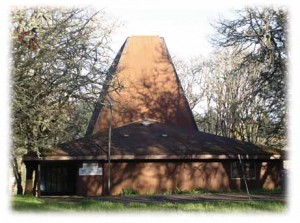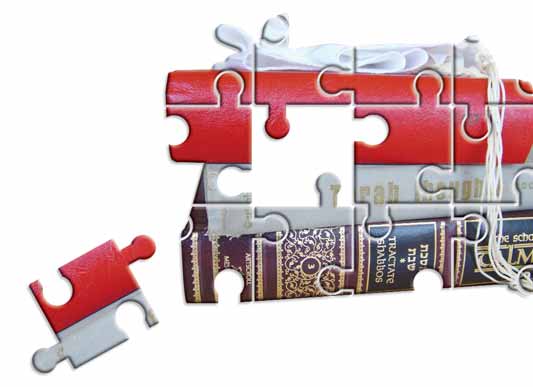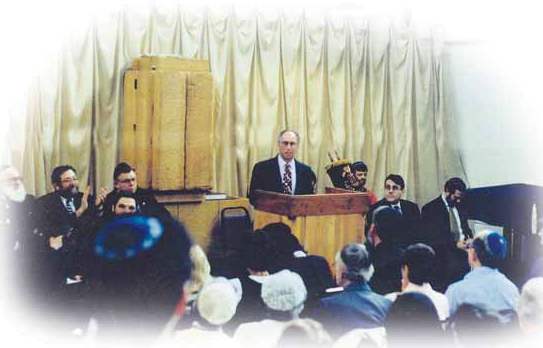The Making of an Orthodox Community
By Gary Katz
What is it like to be a Jew in Eugene, Oregon? It’s a largely invisible experience. Most people who live here are generous, friendly—and Christian. The local expression “from back East” refers to any place east of Idaho! Most of the locals are not aware of what a Jew is. The inexorable tide of assimilation in America is well advanced in Eugene. There are few Jewish institutions, and they are neither strong nor widely supported.
A medium-sized city, Eugene is located at the isolated end of the large, fertile Willamette Valley, some one hundred miles south of Portland, home of the closest Orthodox shul to ours. The University of Oregon is the city’s largest employer. The majority of Eugene’s 3,000 Jews live in South Eugene, a hilly, forested area, which includes an eclectic mix of university students and staff, business owners, professionals and a significant population of freethinkers and aging hippies.
Walking to shul, especially before a holiday, surrounded by hills, forests and an unpolluted view of the surrounding mountains is a beautiful, spiritual experience. It is also lonely. Sometimes I call an observant friend on Friday afternoon just so I can say “good Shabbos” to someone outside my family.
 Ahavas Torah is the only Orthodox shul in Eugene, Oregon. Photos courtesy of Gary Katz
Ahavas Torah is the only Orthodox shul in Eugene, Oregon. Photos courtesy of Gary Katz
Ironically, I grew up in Detroit, in a largely assimilated home, only to discover my Jewish roots in Eugene, a popular haven for those attracted to the counterculture. I moved to Eugene after graduating from college in 1974. The Jews in town I met were, for the most part, interested in experimenting with New Age, pseudo-Jewish ideas. Discussions around a Friday night potluck supper could include Buddhist thought, an account of a Native American psychedelic hallucination and a pithy—and frequently misquoted—idea by an ancient Jewish sage. We were searching for religious meaning, a type of Judaism our parents had never given us, though I never truly found coherence and consistency in the ideas presented at these earnest, spirited discussions. I did, however, find a wife. Jill and I were married in 1978.
My life was full: Jill and I had three beautiful children. I opened up a bakery, co-founded the local Jewish federation and served on the board of Temple Beth Israel (TBI), Eugene’s only synagogue at the time. (The temple used to be Conservative but recently became Reconstructionist.)
A few years later, however, my life began to unravel when my sister, Nancy, was diagnosed with Hodgkin’s disease. She passed away a year later, at the age of thirty-six, leaving two young children without a mother. My parents and I were bereft. When my father passed away a few years later, I began attending Shabbat morning services at TBI, looking for a place to think and heal. Attending those services stimulated a quest to learn more. But where could I find learning opportunities in Eugene?
TBI did not offer any adult education classes. However, several other “traditional” families had begun moving to Eugene, attracted to the laid-back, alternative lifestyle. I soon learned about various classes being offered. A kabbalah class was being given by a community member who, while not Orthodox, was traditionally oriented. Interestingly enough, the teacher, perhaps unwittingly, led many individuals to the path of Orthodoxy. A Talmud class was being taught by Jake Beck, a Yeshiva University graduate and a Harvard-trained psychology professor at the University of Oregon. For years, Jake and his wife, Ruth, had the only shomer Shabbat home in Eugene. Jake, a brilliant experimental psychologist, had quietly set out to change the local Jewish community. His class eventually served as the nucleus of the Orthodox community in Eugene.
The inexorable tide of assimilation in America is well advanced in Eugene. There are few Jewish institutions, and they are neither strong nor widely supported.
There was also a group of women studying the laws of family purity with a young observant woman. Some of the women were drawn to the topic because they viewed immersing in the mikvah as a new-age spiritual practice; others saw it as an act that empowers women. The group was also interested in raising funds to build a community mikvah. Because the closest mikvah was in Portland, one of the women had attempted to immerse in a rain-swollen river and was almost swept away by the strong current. Rabbi Emanuel Ravad, who lives in Israel and is the director of Mikvah Education International, an organization dedicated to mikvah education, heard about the near drowning. As a result, he promised to visit Eugene and help raise funds to build a mikvah. In the fall of 1992, Rabbi Ravad led a Shabbaton in Eugene to promote mikvah awareness. Members of the three classes came together and held the first Orthodox minyan in Eugene. Rabbi Ravad’s spirited celebration of Shabbat was infectious; interest in having traditional Shabbat services grew.
Our fledgling congregation borrowed a sefer Torah from TBI and began holding weekly minyanim in one of TBI’s classrooms. We opened an after-school program as well. Our congregation, which became known as the Halachic Minyan, became quite popular. TBI’s left-wing leadership was clearly uncomfortable with an upstart observant group in its midst. What may have been most troubling was that our group, composed of professionals and business owners—some of whom were once the core of TBI’s Shabbat morning minyan—was growing quickly. Members of the minyan began to serve as leaders and teachers, pulling the rest of the group along on the path towards greater observance. One member had attended yeshivah in New York as a youngster but had abandoned Orthodoxy. In time, as his commitment to observance returned, his leadership in the Halachic Minyan became essential. He led services, served on the board and was always ready to learn Talmud with anyone. His strong ties to observance and knowledge served as a quiet inspiration to men like me who were literally fumbling on a daily basis to find our way. Eventually, this individual pulled his sons out of public school and moved to Seattle, the closest vibrant frum community.
For the most part, however, we remained isolated from the larger Jewish world. Could Orthodox Judaism survive on this frontier? A turning point for our community occurred in the spring of 1993, when I traveled to Youngstown, Ohio, to attend the Orthodox Union’s National Leadership Conference of Synagogues of Smaller Jewish Communities. At the conference, I established invaluable relationships with rabbis and lay leaders, who continue to help our community in a variety of ways. Additionally, I learned much about what works and what doesn’t in growing a Jewish community. I also learned about the Community Development Program of Torah Umesorah (the National Society for Hebrew Day Schools), which places young rabbis in emerging Jewish communities. As a result, Eugene soon had its first Orthodox rabbi—Rabbi Efraim Davidson—and his family, at a critical time in our growth. We rented a small place to house our school and shul, and changed the minyan’s name to Ahavas Torah. Membership grew to thirty-five families, and our school program included twenty-five children. In 1995, with the help of Rabbi Ravad and others, we built a mikvah in the backyard of a community member.
The author addresses the crowd assembled for the hachnasat sefer Torah held in Eugene in 1997; the Torah was donated by a Holocaust survivor from New York.
By 1996, the shul had forty-five families and needed to move to a larger building. At the peak of our congregation’s growth, scholars-in-residence as well as rabbis from the Seattle kollel would visit for Shabbat. Our minyan celebrated a number of brit milahs and Bar and Bat Mitzvahs. During the summer months, yeshivah students from Torah Umesorah’s SEED program came to study with us.
One of our greatest celebrations was the hachnasat sefer Torah held in the winter of 1997 (see sidebar). Eugene’s mayor, city councilors and many Jews danced in the streets to welcome the arrival of a new sefer Torah, generously donated by Reb Chaim Meir Lipman, a”h, a Holocaust survivor from New York. Participants at the event included the Orthodox Union’s Rabbi Moshe Krupka, Torah Umesorah’s Rabbi Joshua Fishman and Ner LeElef’s Rabbi Moshe Efros. Many local Jews had their first real encounter with frum Jews from outside Eugene.
For the most part, we remain isolated from the larger Jewish world.
The presence of an Orthodox rabbi is invaluable in helping us build and sustain observant life. But young rabbis find it difficult to remain in a community lacking a day school and the social support necessary to maintain frum life. Ironically, our success as an Orthodox community could also lead to our failure. Many of our most involved families end up moving because of the lack of a day school and other necessities for frum life. Within five years of the shul’s establishment, seven member families moved to larger, more established frum communities. Moreover, many members of the broader Jewish community who were initially interested in becoming more religious have resumed their assimilated lifestyle. Today our shul is at a crossroads. We have an active membership of about twenty families and the services of Rabbi Mordechai Horovitz, a part-time rabbi as well as a mashgiach, who spends much of his time traveling. We have regular Shabbat Shacharit services and a minyan less than half the time. But a core group attends shul faithfully, contributing time and money to ensure that our shul survives. We are in jeopardy of losing our mikvah since it is located on the property of a shul member who is moving and selling his house. Currently, we are trying to raise funds to purchase the property for use by the rabbi. Sadly, besides the rabbi’s family and that of a newly arrived Chabad rabbi, there are no other frum families in Eugene. Observance levels among the other Jewish families vary greatly. Because of our dwindling size, the larger Jewish community in Eugene feels less threatened by our presence. Most visiting Jews probably don’t even know that Eugene has an Orthodox shul. Our community may be small and struggling, but our survival may be the one great hope for re-kindling a Jewish future in Eugene.
Currently, my family and I are not observant but continue to try to grow religiously. I remain committed to my shul, and I look forward to a future where I’m part of an observant community. But for now, I walk to shul alone.
Mr. Katz and his wife continue to live in Eugene, Oregon.


